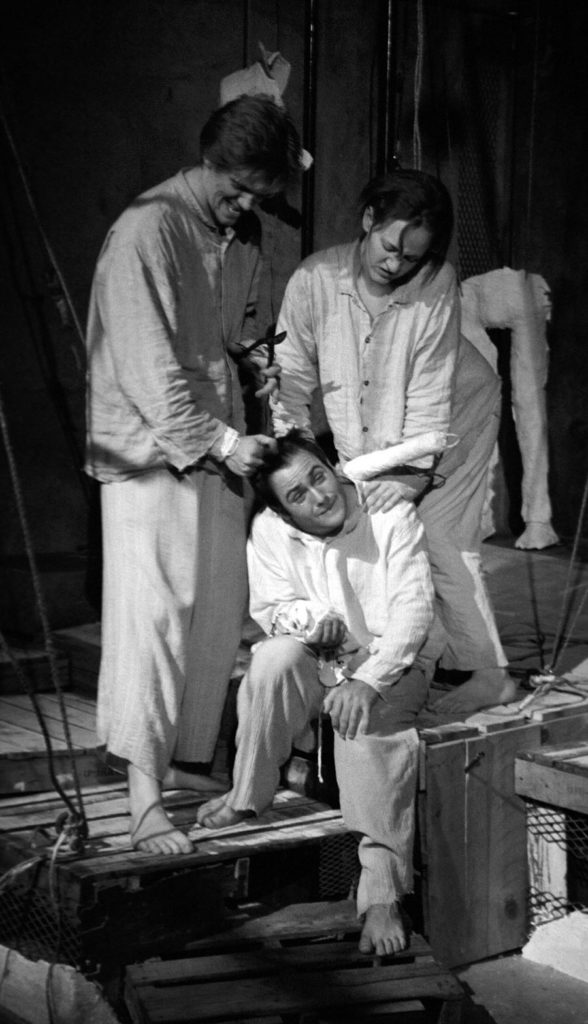There’s a new little warehouse down by the railroad tracks in Denver’s Lincoln Park neighborhood, tucked among ramshackle houses, junkyards, and vacant lots. Inside it, a sextet of theatrical inventors is busy experimenting. They are the founders/members of the Buntport Theater Company, and their fifth (and first non-comic) production is a unique, intelligent adaptation of Anton Chekov’s 1892 short story, “Ward 6.”
Buntport was founded three years ago, when the six were fellow students at Colorado College in Colorado Springs. Their shows to date consist of clever adaptations of literary works, and one original piece, the post-apocalyptic comedy “FIN.” Together, the group forms a complete production team, developing all their material collaboratively and dividing all the on-, off- and backstage work among themselves. Their fresh, imaginative approach to live performance is a welcome relief from standard theatrical fare.
The setting is 1880’s Russia — a small, squalid lunatic asylum near an isolated provincial town, 150 miles from the nearest railway station. The plot is deceptively simple – the presiding doctor, Andrey Yefimitch, begins to find the inmates more congenial than the townspeople, gradually slides into an apathetic madness himself, is committed to his own brutally indifferent institution, and dies. Yet within these confines Chekov explores a multitude of themes – consensual reality’s insubstantial boundaries, society’s inertia and indifference, the vanity and self-deception of intellect. With good reason, Buntport found the story an excellent candidate for dramatization.
The lights rise on a gray concrete corner of the theater space, littered with weathered platforms and strung with an assortment of ropes, from which all the show’s set, prop, and costume pieces are suspended. The effect is stark and claustrophobic. The performers wear shapeless, interchangeable gray outfits. Occasionally, pungent and plaintive sound cues punctuate the action. With the performances, these elements make up a smoothly integrated, accomplished production that fearlessly delves into complex, challenging subject matter far beyond the scope of most regional theaters.
One actor, Brian Colonna, convincingly portrays the unfortunate doctor with a wan look and passive air that steadily increases as the play progresses, sometimes unfortunately reducing him to inaudibility. The other three, Hannah Duggan, Erik Edborg, and Erin Rollman, each take turns playing each of the nine supporting roles. This simultaneously allows them to add their individual inflections to a cumulative characterization, and defuses the audience’s normal identification of actor with role. The playgoer must work hard, devoting complete attention to the proceedings, or risk hopeless confusion — not a bad thing at all.
The play moves along in an unbroken series of scenes, conducted at a deliberate, subdued pace. The adaptation, of necessity, pares away much of Chekov’s rich, illuminating detail but succeeds on its own terms, bringing many of the story’s compelling points into view. There are suggestions that this interpretation wants to indict society and its institutions for hastening the doctor’s doom, but Chekov clearly plants the seeds of Andrey Yefimitch’s downfall within himself, detailing his crippling weaknesses of character, and his snobbish self-absorption, from story’s beginning.
At times, even though the story is inescapably gloomy, the production veers dangerously close to the suffocating air of deadly earnestness comic performers assume when they want to be “serious” onstage. Fortunately, the adroit minds of Buntport avoid this fate by immersing themselves in the execution of this difficult tour de force. Lovers of stark beauty and bold stagecraft will enjoy “Ward 6”, and should look forward to Buntport’s future adventures.
-Brad Weismann, August 10, 2001, Colorado Daily
